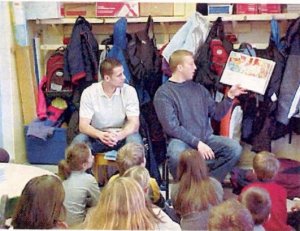

Research on how to include boys as
readers in our schools is growing. Bauer
(2003) conducted a case study with a male
middle school student. He offers these
suggestions; create male centered activities
for boys, incorporate boys' favored learning
styles (kinesthetic, drawing, acting, talking
about ideas and doing plays). Bauer also
believes that fathers need to be more
involved with their children and that
schools need to invite males in to speak to
children. Beers (1996) in a discussion of
boys' and girls' literacy, their likes and
dislikes, recommends reading aloud to
children to awaken their literacy interests.
Literacy as a Social Practice
Accessing and achieving literacy seems to be difficult for boys in a school setting. Boys' literacy is more
likely to be attained outside of school in fun, active ways. Educators and researchers do incorporate research
and ideas from many different fields in developing conceptual frameworks for understanding literacy. The
framework for the male mentor reading program draws on the ideas of literacy as a social practice (Barton,
1994; Barton & Hamilton, 1998; Heath 1983) and on the social constructivism found in the theories of reading
(Goodman, 1991; Harste, Woodward & Burke, 1991) and psychology (Bruner 1986, 1984; Piaget 1962). Another
source of ideas is the social change perspective that comes from research examining the discourses between and
among the various social groups in society (Horseman, 1990, 1994; Smith and Wilhelm, 2002).
The gendered identities that boys adopt or acquire may marginalize them in accessing school literacy. Subjects such as the humanities and English are seen as 'girly' and are not favored by boys in a UK study (Government of UK, 2004). Girls are choosing the sciences and math as well as the humanities, leading to their advancement in many fields. Lysiane Gagnon (2002) in a Globe & Mail opinion editorial worries that the educated women of today will have no choice but to form relationships with "uneducated men stuck in low paying jobs".